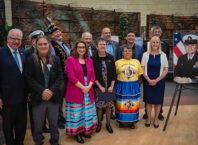A January court ruling shrinking a Wisconsin Indian tribe’s reservation means gambling cannot resume at a golf course and some tribal members may have to pay back taxes.
Congress has eliminated a 46,000-acre reservation given to the Stockbridge-Munsee tribe in 1856, the 7th Circuit Court of Appeals ruled. The decision means the reservation consists of parcels about one-third that size that Congress later set aside for the tribe.
The decision came in a decade-long legal dispute between the state of
Wisconsin and the tribe that started when the tribe purchased Pine
Hills Golf Course and Supper Club in Shawano County in the 1990s.
The golf course is on the original reservation, and the tribe, under
its gambling compact with the state, started operating about 170 slot
machines there. The state filed suit in 1998, saying the slots were
illegal because the land was no longer within the reservation’s
boundaries.
In 1999, U.S. Magistrate Judge Patricia Gorence granted an injunction
that shut down the slot machines while the courts considered whether
they were located inside the reservation. In 2004, she agreed with the
state that the reservation no longer existed as it did in 1856.
The reservation was downsized by an 1871 law that allowed timber
companies to purchase part of the land and eliminated by a 1906 act
that allotted remaining parcels to tribal members, Gorence ruled.
The tribe appealed, but the case was put on hold while the parties
tried to reach a settlement. After negotiations failed, the case
resumed and a three-member panel of the appeals court upheld Gorence’s
decision.
Neither law contained language specifically downsizing or eliminating
the reservation, but a review of the record shows that was Congress’
intent, Judge Terence Evans wrote for the panel. Government agencies
mostly treated the reservation as abolished after the second law
passed, he wrote.
Tribal President Bob Chicks said he was disappointed with the decision
and is reviewing legal options. The tribe could ask the full 7th
Circuit to reconsider the decision or appeal to the U.S. Supreme Court.
The tribe has always claimed the property inside the 1856 boundaries,
which include the townships of Bartelme and Red Springs, Chicks said.
About half of the 1,500 tribal members live inside that area.
If it stands, the decision could have implications for tribal members
who live in the disputed boundaries and have not been paying taxes.
In 2000, the tribe agreed to collect taxes that could be due if its
appeal failed. That escrow account could soon be turned over to the
state. The program was voluntary, however, and some may not have
participated.
Once the case is resolved, the Department of Revenue could seek back taxes and penalties against tribal members.
The ruling is one more setback for the Stockbridge-Munsee, whose
history has been marked by displacement and conflict. The tribe was
pushed from the east coast to near Lake Winnebago in Wisconsin in the
1800s and then forced to give up that reservation in exchange for its
current location in 1856.
The appeals court noted that land “turned out to be heavily forested
and difficult to farm – not quite the arable land that had been
promised in the treaty.” And within 15 years, Congress allowed timber
companies to buy most of it.
Along with the golf course, the tribe owns and operates the Mohican
North Star Casino and Bingo and the Stockbridge-Munsee Health and
Wellness Center.






